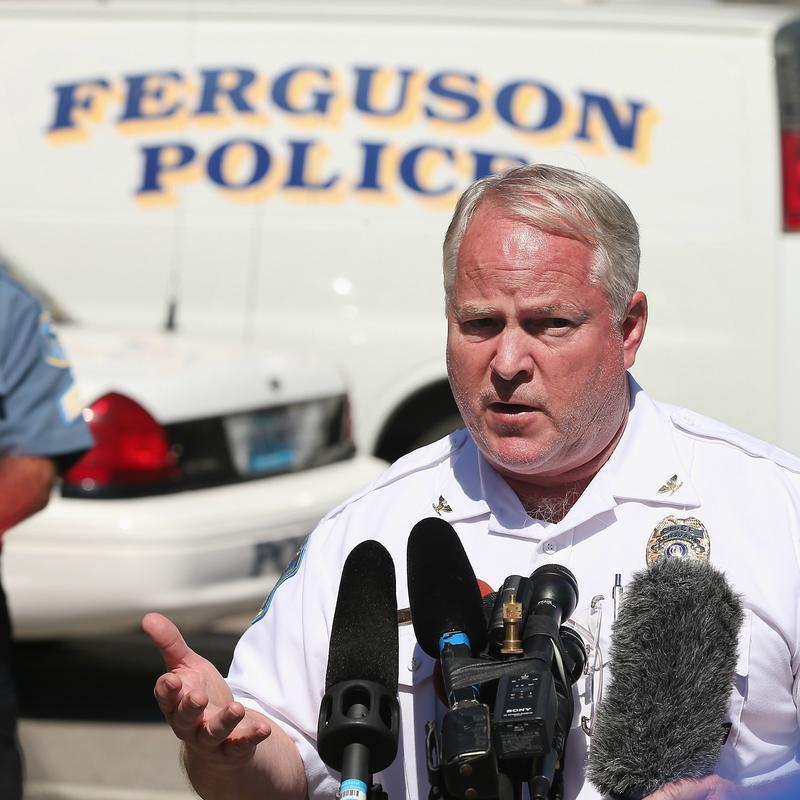***RUSH***
BOB: .The focus on Ferguson have put police departments in the region under intense media scrutiny. No wonder. During confrontations following Michael Brown’s death, the cops fired tear gas and rubber bullets at protesters, arrested peaceful demonstrators and journalists as well. Next Friday, The St. Louis County and Municipal Police Academy will offer a class called “Officer-Involved Shooting: You Can Win with the Media.” The instructor is Rick Rosenthal, a former broadcast journalist and president of RAR communications. He says that good public relations begins with easing the traditional tension between police and the press.
ROSENTHAL: I have done programs where I have brought law enforcement into the room with reporters and it tends to be like a high school fortnightly with the boys on one side and the eighth grade girls on the other side. We start of by talking at one another and then we end up talking about one another and by the end of the program we start talking with one another. But I think that law enforcement in general terms doesn't fully understand mainstream media. And what you don't understand you tend to fear and what you tend to fear you tend to try to crush.
BOB: What do they think about us?
ROSENTHAL: One of the starting points for this meet the other guy program is that I ask law enforcement and I ask reporters to describe the other guy. And so I get terms like hostile and aggressive and pushy. And it's each side describing the other.
BOB: The police response to the events in Ferguson was roundly criticized by I think just about everybody. And I'm not going to ask you to comment on that. But I will ask you what you're going to tell the officers who attend your seminar.
ROSENTHAL: To deal with the media relations aspects of the situation even as you begin the investigation. Even as you deal with all of the other aspects of any such incident. I'm not saying that media relations is the primary and principal first focus, but it has to be a part of the process. The National Incident Management System which the federal government brought to us a number of years ago now in the wake of 9/11 makes media relations and public information a cabinet level function and in my opinion that is appropriate. To the extent that you have the knowledge, you've got to step-up and provide factual information in a timely manner.
BOB: As a practical matter if you don't, you lose control of the story. And you let irresponsible players fill in the blanks in ways that can do it a disservice to everybody.
ROSENTHAL: Nature does abhor a vacuum and in any information vacuum, social media will step in. And individual citizens with truly no knowledge of a situation will start voicing innuendo, hearsay, speculation and rumor and all of that takes on the aura of fact to the detriment of the individuals involved, the organization, the family - it doesn't help anybody. It hurts.
BOB: Now obviously police are reluctant to provide information that could compromise an investigation
ROSENTHAL: Yes.
BOB: But that has often been used an excuse to stonewall altogether especially, especially if an officer has been involved in a shooting.
ROSENTHAL: I think that law enforcement and the citizens in any individual community and the media in general I would hope would first and foremost be interested in justice. And that means that the sanctity of the information must be safeguarded but by the same token if there is an information vacuum then we get back to social media filling in that vacuum. So my recommendation is middle ground. Please law enforcement tell us what you can and without being specific about the details of the investigation you can share with us the general process. What's in going to look like. My strong recommendation is that there be as much transparency as is possible. Always consistent with law enforcements other needs.
BOB: If we agree that public relations is really not the most important issue in the aftermath of a shooting death, is the very title of your seminar -- 'you can win with the media' something on the cynical side?
ROSENTHAL: I don't want the law enforcement community to win at the expense of the community, nor do I want the media to take advantage of and abuse the law enforcement community. We both come out of this media and law enforcement getting a fair shake. If I can help law enforcement understand the mechanics of broadcast journalism and print journalism of which I was a part for the better part of 30 years then I think everyone's going to win.
BOB: Rick, thank you very much.
ROSENTHAL: IT's been a pleasure Bob, thank you.
BOB: Former Chicago news anchor Rick Rosenthal is a media relations consultant and president of RAR communications.

